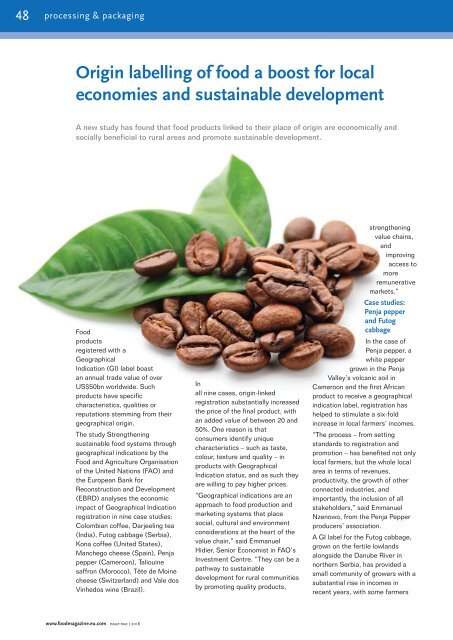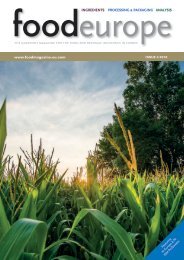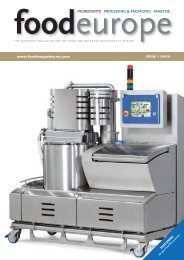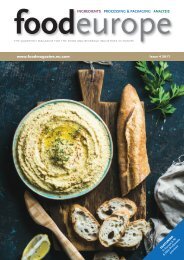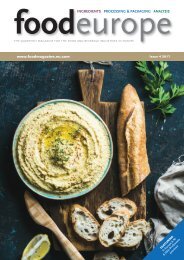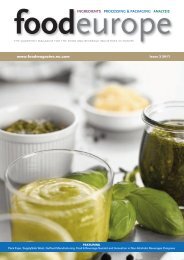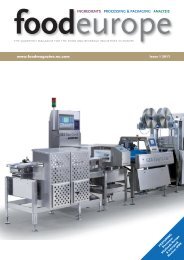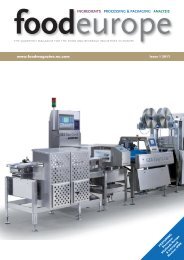Issue 2 2018
Create successful ePaper yourself
Turn your PDF publications into a flip-book with our unique Google optimized e-Paper software.
48<br />
processing & packaging<br />
Origin labelling of food a boost for local<br />
economies and sustainable development<br />
A new study has found that food products linked to their place of origin are economically and<br />
socially beneficial to rural areas and promote sustainable development.<br />
Food<br />
products<br />
registered with a<br />
Geographical<br />
Indication (GI) label boast<br />
an annual trade value of over<br />
US$50bn worldwide. Such<br />
products have specific<br />
characteristics, qualities or<br />
reputations stemming from their<br />
geographical origin.<br />
The study Strengthening<br />
sustainable food systems through<br />
geographical indications by the<br />
Food and Agriculture Organisation<br />
of the United Nations (FAO) and<br />
the European Bank for<br />
Reconstruction and Development<br />
(EBRD) analyses the economic<br />
impact of Geographical Indication<br />
registration in nine case studies:<br />
Colombian coffee, Darjeeling tea<br />
(India), Futog cabbage (Serbia),<br />
Kona coffee (United States),<br />
Manchego cheese (Spain), Penja<br />
pepper (Cameroon), Taliouine<br />
saffron (Morocco), Tête de Moine<br />
cheese (Switzerland) and Vale dos<br />
Vinhedos wine (Brazil).<br />
In<br />
all nine cases, origin-linked<br />
registration substantially increased<br />
the price of the final product, with<br />
an added value of between 20 and<br />
50%. One reason is that<br />
consumers identify unique<br />
characteristics – such as taste,<br />
colour, texture and quality – in<br />
products with Geographical<br />
Indication status, and as such they<br />
are willing to pay higher prices.<br />
“Geographical indications are an<br />
approach to food production and<br />
marketing systems that place<br />
social, cultural and environment<br />
considerations at the heart of the<br />
value chain,” said Emmanuel<br />
Hidier, Senior Economist in FAO’s<br />
Investment Centre. “They can be a<br />
pathway to sustainable<br />
development for rural communities<br />
by promoting quality products,<br />
strengthening<br />
value chains,<br />
and<br />
improving<br />
access to<br />
more<br />
remunerative<br />
markets.”<br />
Case studies:<br />
Penja pepper<br />
and Futog<br />
cabbage<br />
In the case of<br />
Penja pepper, a<br />
white pepper<br />
grown in the Penja<br />
Valley’s volcanic soil in<br />
Cameroon and the first African<br />
product to receive a geographical<br />
indication label, registration has<br />
helped to stimulate a six-fold<br />
increase in local farmers’ incomes.<br />
“The process – from setting<br />
standards to registration and<br />
promotion – has benefited not only<br />
local farmers, but the whole local<br />
area in terms of revenues,<br />
productivity, the growth of other<br />
connected industries, and<br />
importantly, the inclusion of all<br />
stakeholders,” said Emmanuel<br />
Nzenowo, from the Penja Pepper<br />
producers’ association.<br />
A GI label for the Futog cabbage,<br />
grown on the fertile lowlands<br />
alongside the Danube River in<br />
northern Serbia, has provided a<br />
small community of growers with a<br />
substantial rise in incomes in<br />
recent years, with some farmers<br />
www.foodmagazine.eu.com issue two | <strong>2018</strong>


